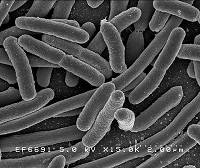 |
Despite a great market opportunity, there is currently no vaccine to protect against the Escherichia coli (E. coli) bacterium. So far, vaccine development has been stymied because the genetic structure of the many strains of E. coli varied hugely. But according to a new study, the diversity of E. coli's numerous strains is not as vast as previously thought, inspiring hopes that a global vaccine can be developed.
In a study published in the journal Nature Genetics--the largest yet of the bacterium--researchers mapped the genome of 362 different E. coli strains that spanned 20 countries and three decades. They compared how different strains attach to the stomach lining, and were surprised to find how closely related the different types of E. coli were. Strains that cause illness in South America, for example, were "very similar" to strains that affect people in Asia and Africa, they found. Some strains have even spread globally from a common starting point.
The new data open up the possibility to "target a broad range of [E. coli] groups with one vaccine," Professor Gordon Dougan, senior study author from the Wellcome Trust Sanger Institute, said in a statement.
 |
| Professor Gordon Dougan--Courtesy of the Sanger Institute |
So far, E. coli vaccine progress has been limited. In 2010, Novartis ($NVS) researchers made a gene map of the E. coli bacterium. Using this map, they found 9 antigens that, when given to mice, protected them from disease when they were infected with E. coli.
And Ann-Mari Svennerholm, one of the Nature Genetics study's co-authors, and her team at the University of Gothenburg in Sweden, have worked for decades toward an E. coli vaccine, said Åsa Sjöling of the university and Karolinska Institutet, another author of the study.
"Our work to develop a vaccine has received a real boost from this research," Sjöling said. "This data gives us confidence that a global, future-proof solution is within our grasp."
Their oral vaccine has gone through a clinical Phase I trial among healthy adult volunteers in Sweden, with "promising results" that showed it was safe and well-tolerated, she said.
"Further clinical studies are currently actively planned," Sjöling told FierceVaccines. "A vaccine might hence be on the market within the next few years."
- read the release
- here's the abstract